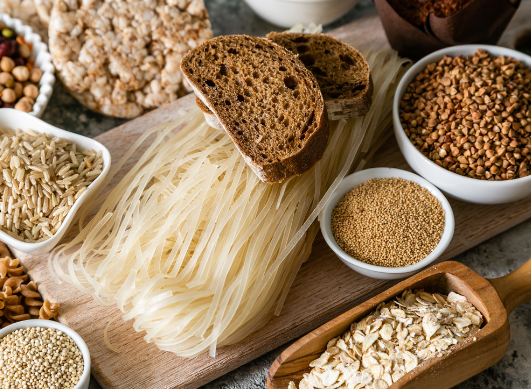- Home
- Share
- Forum
- General forums
- News from the media
- Gluten-free diet should not be eaten by people who are not coeliac, say scientists
Gluten-free diet should not be eaten by people who are not coeliac, say scientists
- 259 views
- 4 times supported
- 6 comments
All comments
![]()
Lipstick
![]()
Lipstick
Last activity on 11/04/2021 at 15:21
Joined in 2015
2 comments posted | 1 in the News from the media group
Rewards
-
Explorer
![]()
corndolly
![]()
corndolly
Last activity on 05/04/2021 at 17:55
Joined in 2016
11 comments posted | 1 in the News from the media group
Rewards
-
Contributor
-
Explorer
I went gluten free about 2 years ago. My chronic fatigue has improved dramatically, my joint pain almost non existent. My skin improved too, I had "odd" pimple type skin on my thighs and upper arms which has gone. I also lost all the gastro intestinal problems like bloating and colic. I did find it difficult to eat out here in Ireland as almost everything has some gluten in it. Because of the negative comments around gluten free and under the advice of my endocrinologist (I have type 2 diabetes) I returned to eating bread and gluten and all my symptoms returned with a vengeance. I had to go to bed again every afternoon , sometimes also in the morning, my daily walk was curtailed and my colic was horrendous. My blood sugar was rising and more medication was offered. I felt awful.
I have now started a keto diet(endocrinologist doesn't know yet) with no carbs and definitely no grains/gluten and after 4 weeks feel amazing. My blood sugars are normal and all other complaints gone. So I will be staying carb and so gluten free, It suits me. I am eating more natural non processed foods, the food we eat today is so mass produced and even the grains we eat are designed to have more gluten for the modern market. Going gluten free made me read every label and ask about every product and the amount of gluten we eat in foods that are not grain based is amazing eg gravy. If grains are so important to heart health then do celiacs have a higher risk of heart disease?And if so is it actually related to not eating grains or something else. Do eskimos? I just think non celiac gluten intolerance is just how some bodies deal with overload. Maybe gluten and grains do not suit everyone. If you don't have an issue then eat it, if you have then dont.

Unregistered member
I have suffered with what most G.P's call IBS for years but never constipation, ever! Since minor surgery 3 years ago things have improved but I still have to be careful about my diet, although am not strictly, apart from eating less meat unless I buy free range (also because of animal welfare reasons). My G.P suggested a year ago that I try cutting out or reducing onions and garlic and certain vegetables and fruit. A specialist nurse 3 years ago suggested I eat gluten-free bread and some gluten-free products to see if this helped with symptoms such as excessive gas. It has. However I am not completely or strictly gluten-free, but when I eat out I do sometimes go for gluten-free pizza, etc. or other gluten-free choices, if offered, but not always. It is a choice for me probably and not a necessity, but by eating SOME gluten-free products mixed in with other gluten food products, I now have a pretty good idea about the ingredients etc that affect my "IBS" symptoms!
![]()
Martyn
![]()
Martyn
Last activity on 12/05/2020 at 20:24
Joined in 2016
11 comments posted | 1 in the News from the media group
Rewards
-
Contributor
-
Messenger
-
Explorer
-
Friend
My wife has primary progressive MS. Since she has been GF her energy levels have rocketed, her T2 diabetes has gone and she is no longer fatigued. We are informed that gluten causes inflammation of the gut. It certainly works for us.
See the signature
Martyn
![]()
Mollymor!
![]()
Mollymor!
Last activity on 10/08/2020 at 16:50
Joined in 2015
2 comments posted | 1 in the News from the media group
Rewards
-
Explorer
Hi
I am gluten and wheat intolerant although many of my family are coeliac. I have always been overweight despite having a good diet but now find huge bloating after eating certain foods like bread, potato, pasta and white rice. I used to suffer from bowel problems when I mixed certain foods like red meat and bread however since I became more aware of my intolerances I have less problems. Still I like to push the barriers and have breaded chicken sometimes. At present my weigh loss journey has plateaued but hopefully by taking check of things it will move on sooner rather than later.
Thanks Folks

sandiew
![]()
sandiew
Last activity on 04/03/2025 at 08:27
Joined in 2014
9 comments posted | 1 in the News from the media group
Rewards
-
Committed
-
Explorer
-
Evaluator
-
Friend
I have had bloating, severe stomach pain,have cut out wheat this seems to of greatly helped my symptoms although I have had no official doctors diagnoses,trying to avoid gluten as it seems to be in everything!bought some rice flour to make pan cakes,not sure if ishould have a milk substitute too,am trying rice milk,feeling ok at moment,was feeling sick all the time,before and after eating,hope it my improve inflammation,as I have arthritis.
See the signature
sandiew
Give your opinion
Survey
Articles to discover...

14/03/2025 | Nutrition
Carbohydrates: Friend or foe? Everything you need to know to make the right choices!
Subscribe
You wish to be notified of new comments
Your subscription has been taken into account







Margarita_k
Community managerGood advisor
Margarita_k
Community manager
Last activity on 07/10/2020 at 11:39
Joined in 2016
1,195 comments posted | 154 in the News from the media group
1 of their responses was helpful to members
Rewards
Good Advisor
Contributor
Messenger
Committed
Explorer
Evaluator
Gluten-free diets should not be encouraged among people who do not have coeliac disease, scientists have said.
Gluten is a protein found in wheat, rye and barley and gives food a chewy texture and elasticity during the baking process.
Around one per cent of Britons are genuinely gluten-intolerant, and face a string of debilitating symptoms including vomiting, nerve problems, anaemia, inflammation and an increased risk of coronary heart disease.
However some estimates put the proportion of adults adhering to gluten-free diets in the UK at more than 12 per cent, many believing that it is better for the heart.
Researchers at Harvard University looked at data from nearly 120,000 people over 26 years and found that going gluten-free did not cut the risk of heart disease.
And they warned that restricting dietary gluten may result in a low intake of whole grains, which are known to be beneficial for the heart.
“The popularity of a low gluten or gluten-free diet in the general population has markedly increased in recent years,” said Dr Andrew Chan, of Harvard Medical School and Massachusetts General Hospital in the BMJ.
“However these findings underscore the potential that people who severely restrict gluten intake may also significantly limit their intake of whole grains, which may actually be associated with adverse cardiovascular outcomes. The promotion of gluten-free diets among people without coeliac disease should not be encouraged.”
The UK “free from” market is growing rapidly and expected to be worth £550 million by 2019.
Market analysis Mintel claim that in 2015 12 per cent of new food products launched in the UK carried a gluten-free claim, up from 7 per cent in 2011.
Last year Catherine Collins, the chairman of the British Association of Dieticians, said the dramatic increase in people opting for free from diets was partly down to the rise of celebrity food bloggers such as Gwyneth Paltrow, and “clean eating” gurus such as Jasmine and Melissa Hemsley, as well as a new culture of posting photographs of food on social media.
However a recent study by Harvard also suggested that ingesting only small amounts of gluten, or avoiding it altogether, increases the danger of diabetes by as much as 13 per cent. The authors point out that the new research is only an observational study, so no firm conclusions can be drawn about cause and effect.
However they warn that “promotion of gluten-free diets for the purpose of coronary heart disease prevention among asymptomatic people without coeliac disease should not be recommended.”
___________________
Are you or have you been on a gluten-free diet? Who recommended it to you and why?
What is your feedback - can you say that it imroved your overall health or made you feel better?
Your experience will be much appreciated
The Telegraph